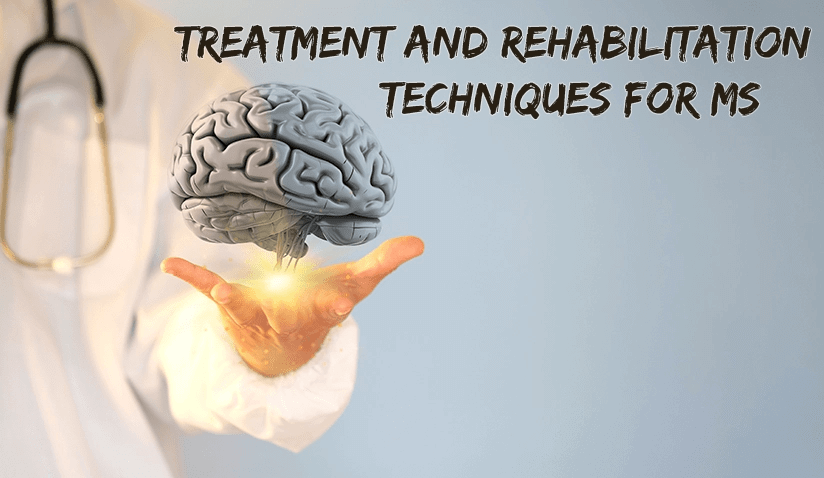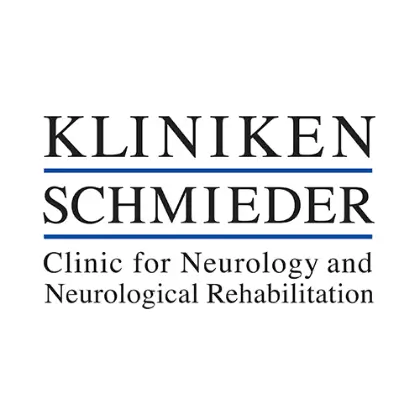Multiple Sclerosis (MS) – Treatments and Rehabilitation Techniques

Multiple Sclerosis (MS) is classified as a chronic inflammatory demyelinating condition involving the central nervous system. The disorder causes the immune system to mistakenly attack the protective covering (myelin sheath) of nerve fibers, leading to communication disruptions between the brain and the rest of the body.
MS can be of four types: relapsing-remitting MS (RRMS), primary progressive MS (PPMS), secondary progressive MS (SPMS, which is less common), and progressive-relapsing MS (PRMS, the rarest form). Following the initial phase of relapsing-remitting multiple sclerosis (RRMS), secondary progressive multiple sclerosis (SPMS) develops. Some individuals with RRMS eventually develop a secondary progressive course, in which neurologic function deteriorates over time and disability rises.
Once considered only a demyelinating illness, it is now known that the pathophysiology is much more complicated in MS. Brain atrophy and widespread axonal degeneration first show early in the course of the disease and are particularly noticeable in progressive forms. An important factor in MS-related permanent impairment is axonal damage.
MS displays a wide range of symptoms, including fatigue, muscle weakness, coordination difficulties, and cognitive impairment. Although there is no cure for MS, several therapies and rehabilitation methods can help patients[1] manage their symptoms, slow down the disease's development, and enhance their quality of life.
Multiple Sclerosis Treatments
Disease-Modifying Therapies (DMTs)
Disease-modifying therapies are the cornerstone of MS treatment. These medications serve to decelerate disease progression and reduce the frequency and intensity of relapses. DMTs such as Interferons, Glatiramer acetate (Copaxone, Glatopa), and monoclonal antibody ofatumumab (Kesimpta, Arzerra) function by altering the immune response, lowering inflammation, and protecting the nervous system from further damage.
Symptomatic Treatment
Symptomatic treatments aim to alleviate specific symptoms of MS. For example, medications may be prescribed to manage fatigue, muscle spasms, pain, bladder and bowel dysfunction, and sexual dysfunction. A few of the latest oral medications developed for the treatment of MS include Teriflunomide (Aubagio, Siponimod (Mayzent), Dimethyl fumarate (Tecfidera), Fingolimod (Gilenya), Cladribine (Mavenclad), Monomethyl fumarate (Bafiertam), Ozanimod (Zeposia), and Ponesimod (Ponvory).
Rehabilitation Techniques
Rehabilitation plays a vital role in managing MS symptoms and optimizing overall function. It focuses on maximizing independence, improving mobility, and enhancing quality of life. Some key rehabilitation techniques include:
Therapy for Relapses
The therapy of relapses in multiple sclerosis focuses on reducing the severity and duration of acute attacks. High-dose corticosteroids, such as intravenous methylprednisolone, are commonly used to suppress inflammation and hasten recovery. Steroid treatment can help alleviate symptoms and promote remyelination in the affected areas of the central nervous system.
Immunomodulation and Immunosuppression
Immunomodulatory and immunosuppressive therapies are employed in multiple sclerosis to modify the immune system's response and reduce the frequency of relapses. These treatments aim to slow down the progression of the disease and prevent new lesions from forming.
Symptomatic Therapy
Symptomatic therapy refers to the treatment of specific symptoms associated with multiple sclerosis. It involves addressing individual symptoms to enhance the quality of life for people with MS.
Treatment of Spasticity
Spasticity is a common symptom in MS characterized by increased muscle tone, stiffness, and involuntary muscle contractions. Treatment options for spasticity may include medications such as muscle relaxants, physical therapy to stretch and strengthen muscles, injections of botulinum toxin (Botox) to temporarily paralyze specific muscles, and in severe cases, surgical interventions such as selective dorsal rhizotomy or intrathecal baclofen pump implantation.
Pain Therapy
Pain management strategies in multiple sclerosis may involve the use of analgesic medications, physical therapy, heat or cold therapy, Transcutaneous Electrical Nerve Stimulation (TENS), Acupuncture, or relaxation techniques. The goal is to reduce pain levels, improve daily functioning, and enhance overall well-being.
Treatment of Bladder Dysfunction
Bladder dysfunction is a common problem in MS, including symptoms such as urgency, frequency, hesitancy, and incontinence. Treatment options may include lifestyle modifications, pelvic floor exercises, medications to relax or contract the bladder muscles, intermittent catheterization to empty the bladder, and in some cases, surgical procedures to address more severe bladder dysfunction.
Treatment of Speech and Swallowing Disorders
Speech and swallowing difficulties can occur in MS due to muscle weakness and coordination problems and can be treated by exercises to strengthen the muscles involved in speech and swallowing, compensatory strategies, and the use of assistive devices or modified diets to ensure safe swallowing.
Treatment of Fatigue and Depressive Disorders
Management of fatigue may involve energy conservation techniques, lifestyle modifications, and addressing underlying causes such as sleep disturbances or depression. Treatment of depressive disorders in MS may involve counseling, psychotherapy, and in some cases, antidepressant medications.
Nutrition
While no specific diet can prevent or treat MS, it is vital to maintain a healthy and balanced diet for general well-being. It is typically advisable to consume a diet rich in whole grains, fruits, vegetables, lean proteins, and healthy fats.
New MS Rehabilitation Techniques
New rehabilitation techniques aim to enhance symptom management, promote functional abilities, and optimize overall quality of life. A few emerging rehabilitation techniques in the field of MS include:
Virtual Reality (VR) Therapy
VR therapy can be used for balance training, gait retraining, and functional tasks. It provides a secure and controlled environment for individuals to practice movements, improve coordination, and increase confidence in daily activities.
Robotics-Assisted Therapy
Robotics-assisted devices, such as exoskeletons and robotic limbs, offer new possibilities for MS rehabilitation. These devices provide support, assist with movements, and offer repetitive practice for strengthening and retraining motor skills.
Mind-Body Interventions
Techniques such as mindfulness-based stress reduction, yoga, and tai chi are gaining recognition in rehabilitation for multiple sclerosis. These mind-body interventions can help manage stress, improve emotional well-being, and enhance physical functioning, which can positively impact symptoms such as fatigue, pain, and mood disturbances.
Telerehabilitation
This approach allows individuals to receive remote rehabilitation services through video conferencing and telecommunication tools and guidance for exercises and therapy sessions from the comfort of one's home.
Assistive Technologies
Advances in assistive technologies include mobility aids, adaptive devices, and smart home systems that can help with mobility, communication, environmental control, and cognitive support, promoting greater autonomy and quality of life.
Frequently Asked Questions (FAQs) on Multiple Sclerosis
What are the causes of MS?
The exact cause of MS is not clearly understood, but both genetic and environmental factors have been implicated. Factors such as immune system dysfunction, viral infections, and certain genetic predispositions may contribute to the development of MS.
When does MS occur? (typical age of onset)
MS is frequently diagnosed in young adults between the ages of 20 and 40. However, older adults and children are also susceptible to it.
What are the early signs of MS?
MS symptoms can vary greatly depending on the individual. However, studies point to the following signs that often occur early on.
- Optic neuritis (a condition that causes eye pain with movement and rapid vision loss) and other eye-related problems such as blurry or double vision
- Muscle weakness, particularly in the hands and legs, accompanied by muscle stiffness and painful spasms
- Fatigue
- Paresthesia (Tingling, numbness) or pain in the arms, legs, trunk, or face
- Gait and balance problems, such as unsteadiness while walking and dizziness
- Problems with bladder control
Who is at risk of developing MS?
MS can affect anyone, but it is more commonly diagnosed in women than in men. All racial and ethnic groups are susceptible to it, although it is more frequently seen in individuals of Northern European descent.
How is MS Diagnosed?
The conclusive diagnosis of MS involves a comprehensive approach, factoring in medical history, physical examination, neurological tests, and imaging techniques such as MRI (Magnetic Resonance Imaging). Per the current guidelines, the laboratory analysis of cerebrospinal fluid is of fundamental significance. This involves detecting oligoclonal bands (OCBs) in the cerebrospinal liquor. In MS, myelin breakdown results in the release of certain proteins into the spinal fluid. MS can be a potential diagnosis when these proteins are found in the spinal fluid but not in the blood. It is important to note that the analysis of OCBs has its limitations and is not exclusive to MS. Therefore, a combination of clinical evaluation and other diagnostic findings is still necessary for a definitive MS diagnosis.
The Takeaway
Multiple Sclerosis is a complex condition requiring a comprehensive approach to treatment and rehabilitation. While disease-modifying therapies aim to slow disease progression, rehabilitation techniques are crucial in managing symptoms, improving function, and enhancing the overall quality of life. Through a combination of medical treatments, physical therapy, occupational therapy, speech and swallowing therapy, and cognitive rehabilitation, individuals with MS can maximize their independence and lead fulfilling lives despite the challenges posed by the disease.

As pioneers in Neurological Rehabilitation since 1950, Kliniken Schmieder has set new medical standards utilizing the latest therapeutic innovations in areas such as physiotherapy, occupational therapy, recreational therapy, and new feedback-guided devices for the upper extremities. The group specializes in comprehensive Neurological Rehabilitation, starting with managing acute neurological illnesses, such as epilepsy and encephalitis, Early Rehabilitation of patients recovering from traumatic brain injury or stroke to Post-Primary Rehabilitation. Depending on the patient's condition, recovering basic functions, achieving independence in activities of daily living, or relearning to swallow or speak are some of the program's goals. Annually, over 14,000 patients from across the world, in all stages of acute and rehabilitative recovery, benefit from their expertise in neuro rehab. Currently, Kliniken Schmieder operates a network of six cohesive clinics across Germany, which have earned global recognition as Centers of Excellence in Neurorehabilitation.
References:
Featured Blogs



